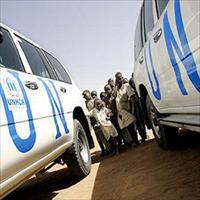SUDAN: Worsening banditry threatens humanitarian effort in Darfur

Relief agencies in Sudan have expressed concerns over an alarming increase in the number of attacks by bandits against people carrying out humanitarian work in the strife-torn region of Darfur, and warned that violence is threatening to disrupt aid delivery to thousands of needy people.
"These attacks are reaching unprecedented levels and they are getting worse," Edward Carwardine, chief of media and external relations in the Sudan office of the UN Children's Fund (UNICEF), told IRIN.
He cited an incident on 20 March when four State Water Corporation staff working with UNICEF were kidnapped in North Darfur and their drilling equipment was taken away, saying, as a result, 180,000 people ran the risk of not receiving clean water this year.
Emilia Casella, head of public information at the UN World Food Programme (WFP-Sudan), said there had been "very alarming rates of banditry" directed at WFP convoys and it was now taking longer for WFP contracted trucks to deliver food to the agency's warehouses in Darfur.
"All parties must realise that humanitarian personnel and their cargo are there to carry out a neutral humanitarian task," said Casella.
The attacks, she said, have escalated at a time when WFP needed to pre-position as much food in Darfur as possible ahead of the onset of the May-October rainy season when roads become impassable.
According to the office of the UN Resident and Humanitarian Coordinator for Sudan, three humanitarian workers and one contract truck driver have been killed and nearly 90 people working on behalf of the humanitarian operation abducted, mostly during hijacking incidents, since the beginning of 2008. There have been 23 break-ins and armed assaults at humanitarian and UN compounds.
Twenty-nine drivers of WFP-contracted trucks remain unaccounted for after they were abducted at gunpoint.
"Such attacks are unacceptable and indefensible," the office said in a statement issued on 26 March. "Those who commit attacks against humanitarian workers are harming innocent people – many of them children – who depend on humanitarian assistance for their food, health care, water, sanitation and other vital services."
 Back and Next - Back and Next
Back and Next - Back and Next See Also - See Also
See Also - See Also